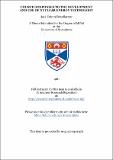Files in this item
Church responses to the development and use of nuclear energy technology
Item metadata
| dc.contributor.advisor | Whyte, James A. | |
| dc.contributor.author | MacSlarrow, Jack Edward | |
| dc.coverage.spatial | 240 p. | en_US |
| dc.date.accessioned | 2018-06-04T09:10:53Z | |
| dc.date.available | 2018-06-04T09:10:53Z | |
| dc.date.issued | 1981-07 | |
| dc.identifier.uri | https://hdl.handle.net/10023/13685 | |
| dc.description.abstract | One of the most consistent criticisms launched against church involvement in the nuclear energy debate, is that the issues are far too complex for the minds of non-nuclear experts. Partially in response to this charge, and partially to clarify what the issues are, the First Chapter of this thesis weighs the major arguments put forth by the various sides of the atomic power debate. The major conclusion reached is that ultimately, the debate is about values - specifically the relationship of man, God, and the creation. The ethical continuum involved seems to be defined at one end by the belief that man stands apart from his environment, is free to manipulate it at will, and that any problem occurring in the environment can eventually be solved with human intelligence and scientific skill. At the other end of the continuum is the conviction that all things existing in the biosphere are related to everything else, and that every gain - particularly if of a technological nature - is achieved at some cost to the total environmental balance. These two perspectives, the middle ground between them, and the overall ecological context surrounding industrial issues, are explored in Chapter Two. The thesis is in basic agreement with those who warn of a deepening ecological crisis. After reviewing the present levels of over-population and food scarcity, environmental pollution, diminution of wildlife habitat, and depletion of natural resources, the deduction made is that the cause of our present predicament rests with human shortsightedness and/or irresponsible arrogance toward the natural environment. The second half of Chapter Two explores several ideological sources of the ecological crisis, and argues strongly in favour of a cultural re-examination of our antiquated environmental principles. Numerous examples of past unenlightened technological decisions made without ethical assessment regarding the biospheric organism, point to the importance of theological input into the present nuclear energy debate. As Chapter One stresses the ethical considerations of the issues surrounding nuclear energy, Chapter Two demonstrates the disastrous consequences of any technological decisions made without attention to ethical assessment. The application of ethical assessment to nuclear technology is the theme of the Third Chapter. Beginning with a survey of various church responses to the development and use of nuclear energy technology, the chapter focuses on the discovery by the churches of their legitimate and important place in the debate. Since the mid-1970s, such major church groups as the World Council of Churches (WCC), the National Council of Churches (NCC), the British Council of Churches (BCC), the French Protestant Federation (FPF), the Evangelical Church in German (EKD), and several British church organisations have cautiously entered into the debate. Motivated by the increasing awareness of reactor safety deficiencies, the perceived link between nuclear energy technology and nuclear weapons, the ecological hazards of radioactive waste, and the attendant long range commitments of nuclear technology, these church groups have persistently attempted to air all of the manifold complexities of nuclear power. In so doing they have independently reached near unanimity in calling for a reassessment of the ultimate worth and desirability of nuclear power. As of this writing, the overwhelming consensus among these church groups concerned with the dilemmas of nuclear energy, is that the hazards of nuclear technology have not been adequately dealt with at either the industrial or national levels to justify further expansion of the nuclear power programme. | en_US |
| dc.language.iso | en | en_US |
| dc.publisher | University of St Andrews | |
| dc.subject.lcc | BR115.A83M8 | en |
| dc.subject.lcsh | Nuclear energy--Religious aspects--Christianity | en |
| dc.title | Church responses to the development and use of nuclear energy technology | en_US |
| dc.type | Thesis | en_US |
| dc.type.qualificationlevel | Doctoral | en_US |
| dc.type.qualificationname | MPhil Master of Philosophy | en_US |
| dc.publisher.institution | The University of St Andrews | en_US |
This item appears in the following Collection(s)
Items in the St Andrews Research Repository are protected by copyright, with all rights reserved, unless otherwise indicated.

